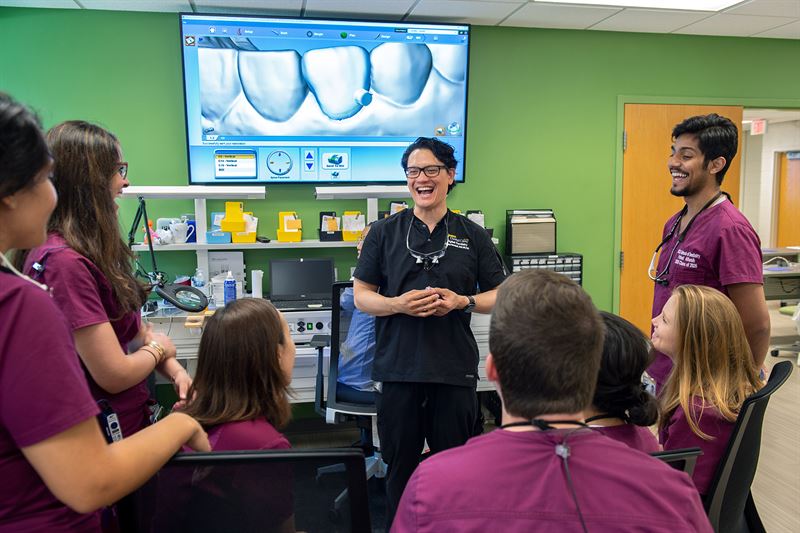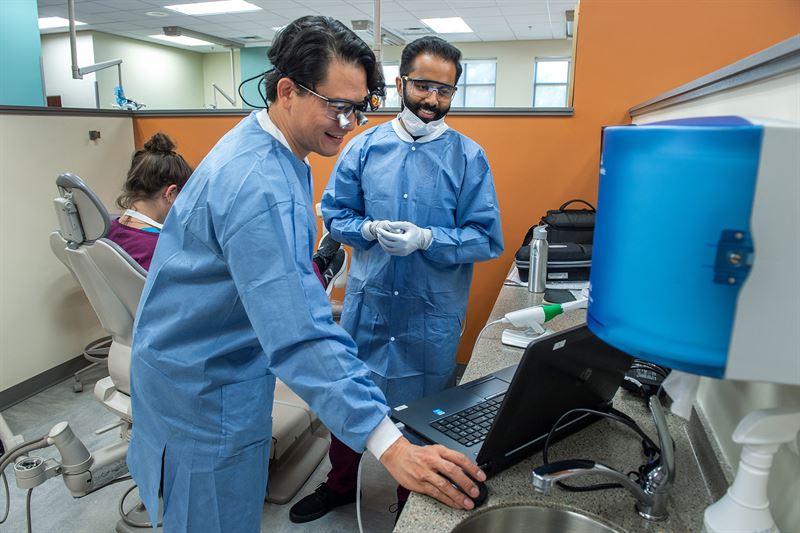Virginia Commonwealth University’s School of Dentistry embraces all-digital era
Dental schools and universities all over the world are training promising students for a lasting career in dentistry. In Richmond, Virginia, U.S., this mission is carried out by Virginia Commonwealth University, where its School of Dentistry is preparing the next generation of dentists for a digital future.

It’s all smiles at the Virginia Commonwealth University School of Dentistry, where the school’s Director of Digital Dentistry, Dr Sompop Bencharit (pictured centre), has transformed the university’s dental manufacturing with cutting-edge CAD/CAM technology from Planmeca.
Virginia Commonwealth University’s (VCU) own digital dentistry journey began in 2016, with the appointment of prosthodontist and digital dentistry enthusiast Dr Sompop Bencharit as Director of Digital Dentistry. Charged with leading the School of Dentistry into an all-digital era, Dr Bencharit immediately set out to transform the university’s dental manufacturing.
VCU’s digital dentistry initiative
Before Dr Bencharit’s digital dentistry initiative, dental students at VCU would routinely make dental impressions using polyvinyl siloxane. Over 80% of crown restorations were porcelain-fused to metal and fabricated through traditional methods. This was not only time-consuming for patients and students alike, but did not give new doctors the experience they needed to keep up with the changing, digitising industry.
With the support of the VCU administration, Dr Bencharit set out to introduce digital CAD/CAM technology to the School of Dentistry. Since then, the school’s intraoral scanners have been upgraded to the blazingly fast Planmeca Emerald™ S scanners, while three Planmeca PlanMill® 30 S milling units have been installed in the school’s brand new, 2,000-foot square laboratory.

Another scan well done: Dr Bencharit (left) and a student inspect the results of an intraoral scan done using the incredibly fast Planmeca Emerald™ S.
The VCU CAD/CAM team has also grown to three faculty members, four dental assistants, and a lab technician. Still more notably, however, the school’s CAD/CAM production of dental crowns has grown exponentially, from none in 2016 to nearly 2,000(!) in 2020. Most of these crowns were done as part of Dr Bencharit’s one-day dentistry protocol using Planmeca equipment.
Digital dentistry powered by Planmeca
Since integrating Planmeca’s technology for same-day dentistry in their work, Dr Bencharit and his CAD/CAM team have also developed a digital dentistry learning path, including didactic, hands-on training through clinical applications.
The training starts in the first year of the Doctor of Dental Surgery (DDS) programme. Students first learn how to do intraoral scanning on typodonts and how to define the crown margin. In the second year, Dr Bencharit and his team teach how to design basic all-ceramic crowns and, in the third year, how to characterise and sinter lithium disilicate crowns. Finally, in the third and fourth years, students get to put this knowledge to practice at the VCU CAD/CAM clinic.
To assess their work, students use Planmeca’s intraoral scanning technology together with the Planmeca Romexis® Compare evaluation tool for universities and dental schools. “It is truly a powerful tool for dental students to be able to see and evaluate their own work on their computer screens,” states Dr Harmeet Chiang, Associate Professor and sleep apnoea specialist at VCU.

Students listening and learning at VCU’s sleek digital dentistry training facilities.
Changing dentistry “in a big way”
Today, the VCU DDS programme has fully embraced digital dentistry on all levels of education in general dentistry and prosthodontics. At the same time, going digital has not only benefitted students, but patients at the VCU Dental Care clinic as well. A crown made with one-day dentistry technology, for example, can cost up to $1,000 less than one made using conventional methods.
“Digital dentistry allows us to do a better job in dentistry with lower overhead cost,” Dr Bencharit confirms. “Digital dentistry is changing the education and practice of dentistry in a big way and will have a long-lasting effect on all dental specialties. It is our aim at VCU to leverage this cutting-edge technology to optimise our dental education and to serve our patients.”
To learn more about VCU’s digital dentistry programme, please visit: https://vcu.exposure.co/improving-care-through-digital-dentistry
Text: Dr Sompop Bencharit, Virginia Commonwealth University; Kyle Hansen, Planmeca USA; Aleksandra Nyholm, Planmeca
Images: Courtesy of VCU University Relations

VCU’s CAD/CAM family. Front: Robert Armstead (left), Dr Harmeet Chiang, Marithe Blacagon, Brandy Geer, and Dr Rami Ammoun. Back: Tam Nguyen (left), Dr Bencharit, April Harris, Dr Awab Abdulmajeed, and Dr Aous Abdulmajeed.
Planmeca Oy and Planmeca Group
Planmeca Oy is one of the world's leading dental equipment manufacturers with a product range covering digital dental units, CAD/CAM solutions, world-class 2D and 3D imaging devices and comprehensive software solutions. Headquartered in Helsinki, Finland, Planmeca’s products are distributed in over 120 countries worldwide. With a strong commitment to pioneering innovations and design, it is the largest privately held company in its field. Planmeca Oy is part of the Finnish Planmeca Group, which operates in the field of healthcare technology. The Group's turnover in 2019 was MEUR 770, and it employs nearly 2,800 people worldwide.
www.planmeca.com
Tags:





